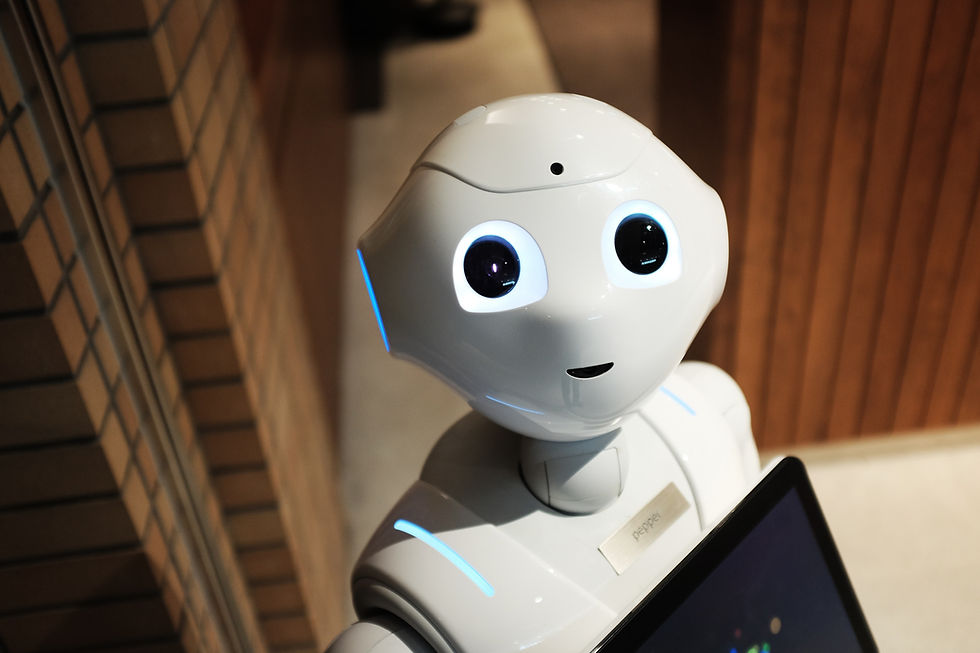𝐄𝐦𝐛𝐫𝐚𝐜𝐢𝐧𝐠 𝐭𝐡𝐞 𝐄𝐯𝐨𝐥𝐮𝐭𝐢𝐨𝐧: 𝐀𝐈'𝐬 𝐈𝐧𝐟𝐥𝐮𝐞𝐧𝐜𝐞 𝐨𝐧 𝐭𝐡𝐞 𝐅𝐮𝐭𝐮𝐫𝐞 𝐖𝐨𝐫𝐤𝐟𝐨𝐫𝐜𝐞
- Reginald Andrews

- Mar 24, 2024
- 3 min read

In the grand tapestry of human history, the advent of Artificial Intelligence (AI) marks a pivotal moment. With every passing year, AI is not just a concept of the future but an increasingly integrated reality in our daily lives. From virtual assistants to self-driving cars, AI is revolutionizing various industries. However, one of the most profound impacts of AI lies in its influence on the future workforce.
As AI technologies advance, there's a prevailing concern about their potential to replace human jobs. While it's true that AI can automate specific tasks, leading to shifts in the job market, its influence on the workforce is multifaceted and far-reaching.
Automation and Job Displacement:
AI's ability to automate repetitive and routine tasks is undeniable. This automation can lead to the displacement of specific jobs, particularly those that involve manual labor or routine data processing. For example, manufacturing and administrative roles are already experiencing significant changes due to automation. However, this displacement also creates opportunities for upskilling and reskilling the workforce for more complex, higher-value roles.
Enhanced Productivity and Creativity:
Contrary to the fear of job loss, AI has the potential to enhance productivity and foster creativity in the workforce. By automating mundane tasks, employees can focus on more strategic and creative aspects of their work. AI-powered tools can streamline processes, analyze data more efficiently, and provide valuable insights, empowering employees to make better decisions and drive innovation within their organizations.
New Job Opportunities:
As AI technologies evolve, they create new job opportunities in emerging fields such as machine learning, data science, and AI development. These roles require diverse skills, including programming, mathematics, and domain-specific knowledge. Moreover, AI also fuels the growth of interdisciplinary roles that bridge the gap between technology and other domains, such as AI ethics specialists and AI project managers.
Human-AI Collaboration:
Rather than replacing humans, AI is more likely to augment human capabilities, leading to collaborative partnerships between humans and machines. This collaborative approach, often called "augmented intelligence," leverages the strengths of both humans and AI systems. For instance, in healthcare, AI algorithms can assist doctors in diagnosing diseases more accurately by analyzing vast amounts of medical data, leading to better patient outcomes.
Addressing Societal Challenges:
AI has the potential to address some of the most pressing societal challenges, including healthcare, climate change, and education. In healthcare, AI-powered diagnostics can improve early detection of diseases, while in education, personalized learning platforms can cater to individual student needs. By leveraging AI to tackle these challenges, the workforce can create a better, more sustainable future for society.

Ethical Considerations and Regulation:
As AI increasingly integrates into the workforce, critical ethical considerations regarding data privacy, bias, and job security are raised. Organizations must prioritize ethical AI practices and implement robust regulatory frameworks to ensure transparency and accountability in AI systems. Additionally, governments and policymakers play a crucial role in shaping the future of work by enacting policies that support workforce development, reskilling initiatives, and the responsible deployment of AI technologies.
AI's influence on the future workforce is profound and transformative. While it may lead to job displacement in specific sectors, it also presents opportunities for enhanced productivity, creativity, and the creation of new job roles. By embracing AI technologies and fostering human-AI collaboration, the workforce can adapt to the evolving landscape and drive innovation across industries. However, addressing ethical considerations and implementing effective regulation is essential to ensure that AI benefits society. As we navigate this transformative era, embracing the evolution of AI in the workforce is critical to shaping a more inclusive, equitable, and prosperous future.


Comments